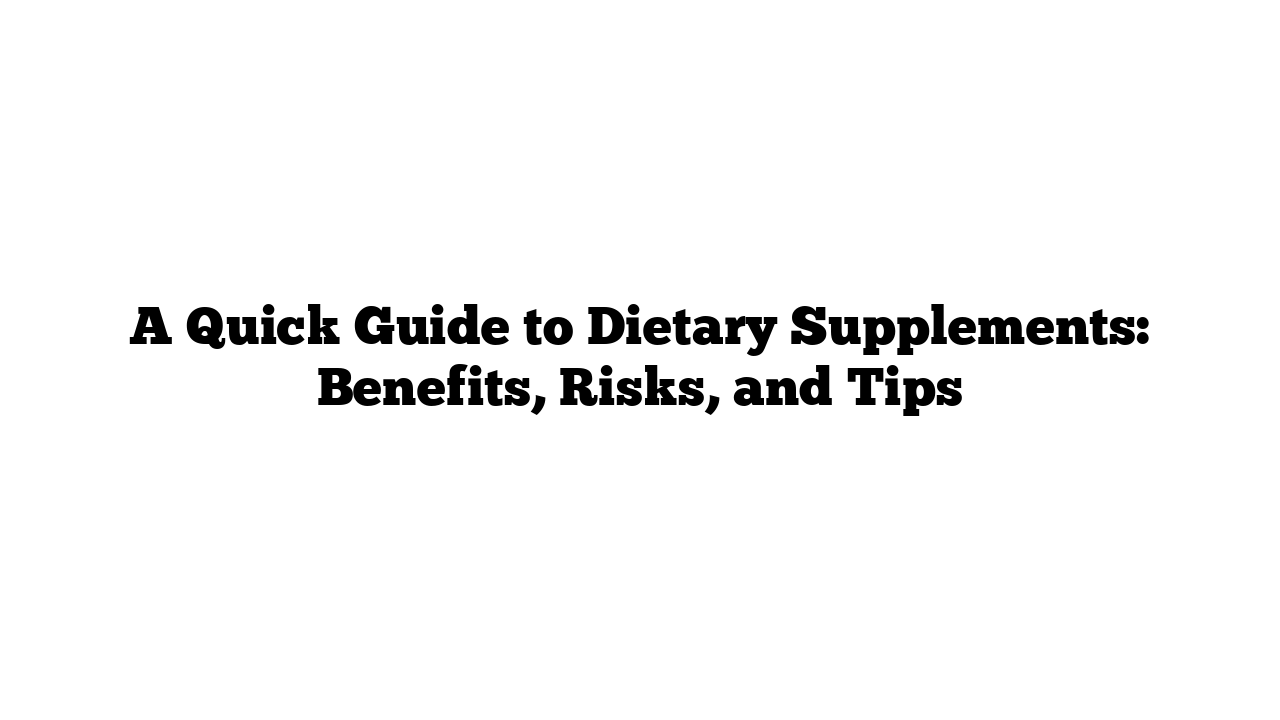Dietary supplements have become a major part of many health routines in the USA, often used to fill nutritional gaps or improve wellness. But what are they really, and do we all need them? This guide provides an easy-to-follow explanation of dietary supplements, their benefits, potential risks, and best practices for safe use.

What Are Dietary Supplements?
Dietary supplements are products meant to add nutrients or enhance the diet. These can come in the form of vitamins, minerals, herbs, amino acids, or other essential nutrients typically found in food. Supplements are available in various forms, such as tablets, capsules, powders, or liquids.
People often turn to supplements for several reasons:
- To boost general health
- To address specific nutrient deficiencies
- To support certain health goals like energy or fitness
Do You Need Dietary Supplements?
Not everyone needs supplements. A balanced diet can provide most of the necessary nutrients for many people. However, some groups may benefit from taking specific supplements, including:
- Pregnant women: Often need more folic acid to prevent birth defects.
- Older adults: May require vitamin D and calcium to support bone health.
- People with dietary restrictions: Vegans, for example, may need vitamin B12 supplements, as this vitamin is primarily found in animal products.
Tip: Always speak to a healthcare provider before starting any supplement to ensure it’s right for you.
Potential Benefits of Dietary Supplements
When used responsibly, supplements can offer several health benefits:
- Fill Nutritional Gaps: Supplements can help people reach their daily nutrient goals if their diet is lacking.
- Support Specific Health Needs: For example, omega-3 fatty acids are often taken for heart health, while probiotics are used for digestive health.
- Promote Optimal Health in Specific Situations: Athletes, people recovering from illness, or those with medical conditions may benefit from tailored supplements.
Important: Supplements should complement a healthy lifestyle, not replace it.
Risks of Overusing Dietary Supplements
Although supplements can provide health benefits, taking too much can lead to serious health risks. Here are some potential dangers:
1. Nutrient Imbalance
Overuse of certain supplements can cause an imbalance of nutrients in your body. For example, excessive iron can interfere with zinc absorption, and too much vitamin A may reduce vitamin D levels.
2. Digestive Problems
High doses of supplements like vitamin C or magnesium can lead to diarrhea, bloating, and stomach cramps.
3. Liver and Kidney Strain
The liver and kidneys work hard to process nutrients, and too many supplements can put stress on these organs, potentially leading to kidney stones or even liver damage.
4. Increased Risk of Chronic Conditions
Overusing certain supplements, such as calcium or vitamin E, has been linked to an increased risk of conditions like heart disease and certain cancers.
5. Allergic Reactions
Some supplements contain ingredients that may trigger allergies. Always check the label and consult a doctor if you have known allergies.
Safe Use of Supplements: Best Practices
To make the most of dietary supplements while minimizing risks, keep these tips in mind:
- Consult Your Doctor First: Before starting any new supplement, get professional guidance. Certain supplements may interact with medications or conditions.
- Stick to Recommended Dosages: More is not always better. Exceeding the recommended dose can lead to harmful side effects.
- Read Labels Carefully: Ingredients and dosages can vary greatly between brands. Look for high-quality, tested products.
- Choose Supplements That Match Your Needs: Don’t follow trends; select supplements based on your individual health goals and needs.
For trusted supplement guidance, visit medicaltimes.io for more health insights.
When Supplements Are Not Needed
If you’re eating a balanced diet full of fruits, vegetables, whole grains, and protein sources, you may not need any additional supplements. Food provides a complex mix of nutrients that work together in ways supplements cannot fully replicate.
Remember: Supplements are meant to support your health, not replace healthy habits.
For more health insights and guidance, visit medicaltimes.io.
For further information and insights, refer to sources like the National Institutes of Health NIH.gov or WebMD webmd.com.
